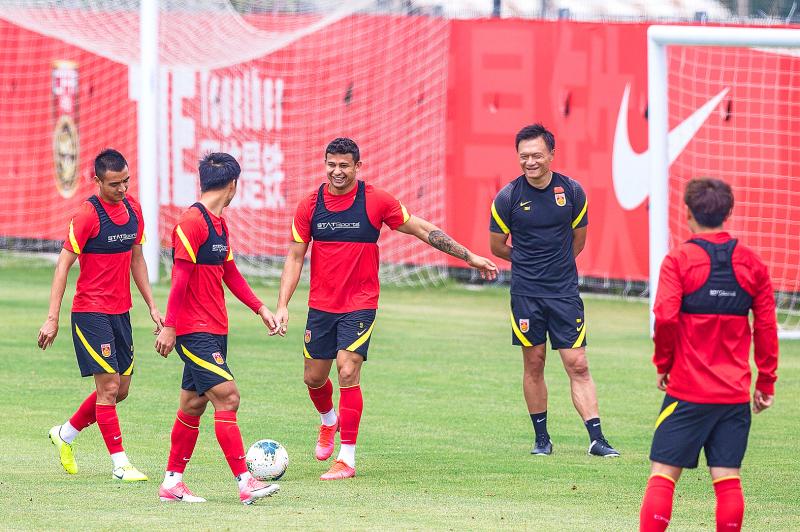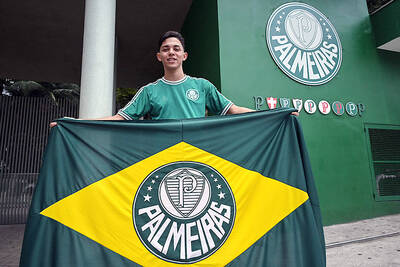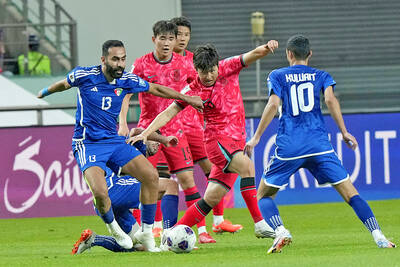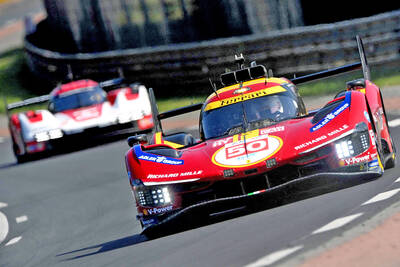When Chinese Super League club Tianjin Tianhai surprisingly thrashed Rafael Benitez’s Dalian Yifang 5-1 to stay in the league in November last year, disgruntled fans were quick to allege corruption — the legacy of a murky past that exploded into scandal 10 years ago.
Benitez, who led Liverpool to the 2005 UEFA Champions League title, was perplexed by one of the heaviest defeats of his coaching career, saying: “This is a game that I don’t quite understand.”
Despite fan complaints to the Chinese Football Association (CFA), no case was brought and there is no evidence of wrongdoing.

Photo: AFP
However, the haste with which some supporters claimed match-fixing is proof that deep scars remain, a decade after a major crackdown on graft that ensnared a string of leading figures in Chinese soccer.
Allegations of organized gambling, crooked referees and match-fixing dogged the sport in China for years, and coupled with the national side’s poor performances, fans were disillusioned, attendance suffered and sponsors fled.
It was in this climate in January 2010 that CFA first vice-president Nan Yong and two other senior CFA figures were hauled in by police on allegations of bribe-taking and match-fixing.
When police raided a Beijing villa belonging to Nan, they discovered gold, diamonds and watches that he confessed came from clubs and referees.
In a widening corruption investigation, scores of CFA officials, club executives, referees, players and agents were questioned in the following months.
“It is an open secret that the chaos in Chinese soccer is not a matter of [only] one rotten egg spoiling the whole pudding,” the China Daily said in January 2010, urging an overhaul.
CFA officials routinely fixed matches, including national team and league games, by buying off players or referees, state media alleged.
Some CFA officials also reportedly accepted payoffs from players desperate to be on the national team — a practice that was also widespread at the club level.
In February 2010, the Guangzhou Pharmaceuticals — who would later be rebranded as Guangzhou Evergrande, winning eight league titles and two Asian crowns — and the Chengdu Blades were relegated for paying bribes.
Referees also began disappearing into police custody. Among them was Lu Jun, who officiated at the 2002 World Cup and the Olympics, earning the nickname “Golden Whistle.”
Wei Di, who replaced the sacked Nan at the top of the CFA, threatened to cancel the 2010 season, saying: “Our goal is to clean up Chinese soccer. We cannot allow this cancer to remain in the body.”
In autumn 2010, the dragnet widened and investigations were launched into Nan’s predecessor, Xie Yalong.
Xie later told a court that police tortured him with electric shocks, beat him and doused him with water during interrogations, although they denied the claims.
Next came the detention of former Shanghai Shenhua general manager Lou Shifang, who won the league title in 2003.
The Shanghai Shenhua were subsequently stripped of the crown.
The 2010 season did take place, but toward the end — to prevent referees and players from fixing the outcomes of matches — halftime was extended from 15 to 30 minutes so that all second halves would kick off at the same time.
FIFA was unimpressed by the arrangement.
“This kind of behavior amounts to amending soccer match rules and is obviously a violation of the rules,” it said.
In the following years, a string of high-profile Chinese soccer figures were locked up.
By February 2013, 33 people had been banned from Chinese soccer for life, 25 were handed five-year bans, and at least 12 clubs were punished — some were dissolved.
Chinese soccer has since risen in stature at the club level, with large-scale investment by Chinese firms and tycoons attracting a flood of players and coaches from overseas.

Brazil has four teams, more than any other country, in the expanded Club World Cup that kicked off yesterday in the US, but for SE Palmeiras, the competition holds a special meaning: winning it would provide some redemption. Under coach Abel Ferreira since 2020, Palmeiras lifted two Copa Libertadores titles, plus Brazilian league, cup and state championships. Even before Ferreira, it boasted another South American crown and 11 league titles. The only major trophy missing is a world champions’ title. Other Brazilian clubs like Fluminense FC and Botafogo FR, also in the tournament, have never won it either, but the problem for Palmeiras

Paris Saint-Germain’s Lee Kang-in has pleaded with South Korea fans to get behind the team at the 2026 FIFA World Cup after more boos were aimed at coach Hong Myung-bo despite leading them to qualification. South Korea reached next year’s finals in North America without losing a game, but that does not tell the whole story. The country’s soccer association has been in the firing line, having scrambled about to find a successor after sacking the unpopular Jurgen Klinsmann in February last year. They eventually settled on Hong, the decorated former skipper who had an unsuccessful stint as coach in 2013-2014, during which

Lionel Messi drew vast crowds and showed flashes of his brilliance when his Inter Miami side were held to a goalless draw by African giants Al-Ahly as the revamped FIFA Club World Cup got off to a festive start on Saturday. Fans showed up en masse for the Group A clash at the Hard Rock Stadium, home to the NFL’s Miami Dolphins, but Messi could not fully deliver, his best chance coming through a last-second attempt that was deflected onto the crossbar. Inter Miami next face FC Porto on Thursday in Atlanta, while Al-Ahly, who benefited from raucous, massive support, are to

Ferrari’s F1 fortunes might be flagging, but the Italian team start this weekend’s 24 Hours of Le Mans as favorites, targeting a third consecutive triumph in motorsport’s fabled endurance classic. Roger Federer is acting as celebrity starter with the tennis icon getting the 93rd edition of the jewel in four-wheeled endurance racing’s crown under way tomorrow. Twenty-four hours later, through daylight, darkness and dawn, the 21 elite hypercars are to battle it out over 300 laps (more than 4,000km) in front of a sold-out 320,000 crowd burning the midnight oil with copious quantities of coffee and beer. Ferrari made a triumphant return after